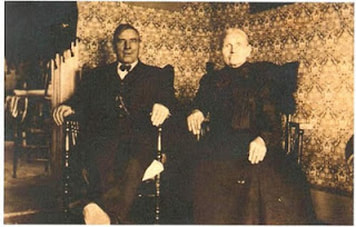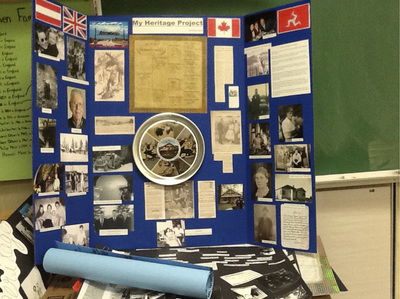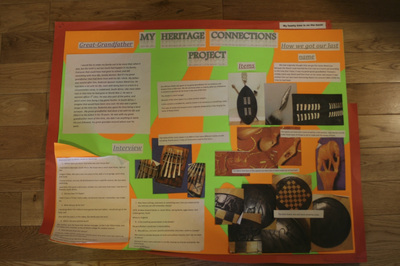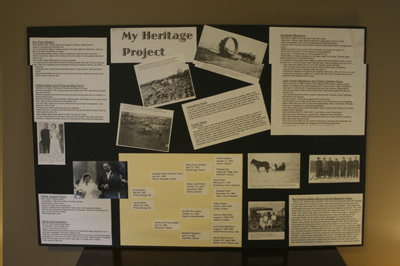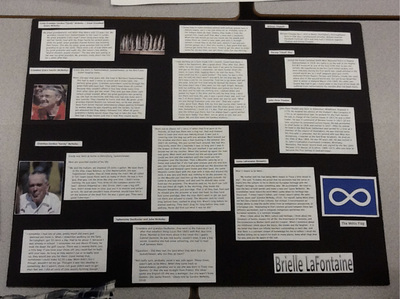CULTURAL AND HERITAGE INQUIRY
Heritage Inquiry Projects
|
At my last school (D.P. Todd Secondary), quite a few of the Social Studies teachers did some kind of Heritage Project or Storywork with their students, particularly in Grade 9 and 10 but also in other contexts. The immediate value is that students connect their own identity to the curriculum. In our experience this is the most effective engagement possible (not just for Heritage but in any area) -- when students connect what they are learning in school to their values, background, interests, ideas that ground them to past, present, and future, we see students for who education is meaningful. The inquiries range from short activities that can be done in one class (or repeated over a few classes) to full-blown project-based learning, forming stages from which critical (historical/geographical) thinking can take place. The inquiries also juxtposition the quirky, wonderful, unique stories from students' past and ancestors with histories and geographies based on more widely available public data.
|
The two main applications of this Heritage Inquiry Program in my own practice have been the Social Studies 9 Skookum Stories Project and the Social Studies 10/11 Echo Project. There is also a role for heritage inquiry in the Grade 12 GeoNarratives project, as well as other identity-based and community-based options for inquiry, some of which are mentioned below.
One of the key aspects to heritage inquiry is the use of interviews with elders: seniors, community and indigenous elders, veterans, and relatives. Other aspects involve gathering primary and secondary sources that help fill in the details and prompt critical thinking amongst students.
One of the key aspects to heritage inquiry is the use of interviews with elders: seniors, community and indigenous elders, veterans, and relatives. Other aspects involve gathering primary and secondary sources that help fill in the details and prompt critical thinking amongst students.
Story Cards - K-12 Social Studies
|
Story Cards Guide • Story Cards Front • Story Cards Back
THANKS to Yvonne Fiala from Vernon (SD22) for translating these! -- Les cartes en français: Cartes d'histoires • Titres des cartes • Dans une liste
THANKS to Yvonne Fiala from Vernon (SD22) for translating these! -- Les cartes en français: Cartes d'histoires • Titres des cartes • Dans une liste
“The same stories heard over and over again become embdedded in one’s being, staying there until reflecion in one’s later years brings adult understandings and sometimes enables one to become a storyteller. Making meaning from a particular story can happen at various phases of human developments; the meaning may change over time. Stories, then, have a way of ‘living,’ of being perpetuated both by the listener/learner’s way of making meaning and by the storytellers, who have an important responsibility to tell stories in a particular way.”
- Jo-ann Archibald / Q’um Q’um Xiiem, Indigenous Storywork, p.113
- Jo-ann Archibald / Q’um Q’um Xiiem, Indigenous Storywork, p.113
“The story and the storyteller both serve to connect the past with the future, one generation with the other, the land with the people and the people with the story.”
- Linda Tuhiwai Smith, Decolonizing Methodologies, p. 146
- Linda Tuhiwai Smith, Decolonizing Methodologies, p. 146
Community Interviews and Inventories
Community Resources -- with teachers, or with your students, start to build an inventory or people and places in your area that offer compelling opportunities for interviews, shared research, storytelling, and hands-on connections. An example of a community resource in Vancouver is the Seaforth Highlanders Armoury -- a treasure trove of artifacts related to WWI. https://www.cbc.ca/news/canada/british-columbia/preserving-history-one-shoebox-at-a-time-at-the-seaforth-armoury-1.3777104
Student & Teacher Resources for conducting Heritage ResearchCanada GenWeb Project
Canadian Gov't - Family History Records Genealogy.com Family Surname Forums Rootsweb Family Search Engine Rootsweb - variety of family research tools Search early Canadian Census records A Guide to Genealogy (US based, but good resources) Tracking your Ancestry with GPS Mapping Genealogy and Ancestry Guide - how to find your family history |
Student & Teacher Resources for Canadian Historical research |
Book titles
Pretty much every school library has a fantastic collection of books related to Canadian and World history. The problem is not "can I find something?" but "where do I begin?" Your teacher-librarian will be the most useful resource as you select titles to aid you in your research. I would also recommend using our course textbook and other reference books and textbooks that we have in the school. If you get your hands on any of the books by Barry Broadfoot, these will provide you with many quotes and primary sources that help illustrate the conditions for ordinary Canadians during different time periods in Canada. For example, his book Ten Lost Years deals with the great Depression and Six War Years covers WWII at home. Another set of books, maybe hard to find nowadays, is the Foxfire Series. This is a collection of "reports" by high school students on the ways of life that were quickly disappearing in their area.
What kinds of things can students put into a Heritage Project?
Found (e.g. reproduced) or original: coins, stamps, letters, maps, flags, drawings, recipes, ribbons, medals, and of course photographs.
A Heritage Project may included interviews (clips, quotes, transcripts, summaries), family trees (charts or diagrams), gathered stories, interpretation of evidence, visual displays (e.g. posterboard), digital presentation (e.g. slideshow, video, website), or a "performative response" (dramatic reenactment, music, dance, original art).
A Heritage Project may included interviews (clips, quotes, transcripts, summaries), family trees (charts or diagrams), gathered stories, interpretation of evidence, visual displays (e.g. posterboard), digital presentation (e.g. slideshow, video, website), or a "performative response" (dramatic reenactment, music, dance, original art).
Examples of Heritage Projects and results of inquiry
How does "Inquiry" fit in?
Like any good project, the focus should not just be about finding stuff to collect and display, but about powerful questions and good storytelling. Students will learn a surprising amount simply from conducting the research and assembling a project, but the next level is achieved when they ask big questions about the work they are doing and find a way to demonstrate their learning through their project presentation. Powerful questions do not have to be complicated. Consider these -- some are simple, some are not, but they are all powerful:
What did World War II mean to my grandparents? How did my family experience poverty in the 1930s and 40s? What can my own family evidence tell me about how the values, goals, and expectations of teens in the 1950s differ from what they are now? Are values, goals and expectations actually tied to entire generations or are they a result of individual families and their circumstances? What role do grief, fear, hope, and joy play in the lives of my ancestors? What connections can I make between the stories that stand out as I conduct heritage research? How much were the lives of ordinary people affected by global events and famous leaders of their time? Looking back at what impresses (or depresses) me about the stories I've gathered, what do I think I would like to pass on to my own children? Is there a "geography" to my heritage -- what role does "place" play in how the stories unfold?
What did World War II mean to my grandparents? How did my family experience poverty in the 1930s and 40s? What can my own family evidence tell me about how the values, goals, and expectations of teens in the 1950s differ from what they are now? Are values, goals and expectations actually tied to entire generations or are they a result of individual families and their circumstances? What role do grief, fear, hope, and joy play in the lives of my ancestors? What connections can I make between the stories that stand out as I conduct heritage research? How much were the lives of ordinary people affected by global events and famous leaders of their time? Looking back at what impresses (or depresses) me about the stories I've gathered, what do I think I would like to pass on to my own children? Is there a "geography" to my heritage -- what role does "place" play in how the stories unfold?
How does "Historical Thinking" and "Geographical Thinking" fit in?
Historical and Geographical Thinking Concepts are at the heart of the revised Social Studies curriculum in British Columbia. They are a good fit for Heritage Inquiry, and can be used as organizing concepts or as end-goals. Here are some examples of research questions that could be used to explore the concepts:
- Establishing Significance: How does a family or cultural story connect with larger events of the time period? What events within these stories has had the most impact on the family or culture? What part is the most important to pass on or remember?
- Using Source Evidence: Can primary sources from the time period (e.g. maps, photos, documents) be used to shed light on particular story or event that is important for the heritage inquiry? From the source evidence gathered around a particular family or culture, how can they be used? Can the evidence be trusted to tell an accurate story? What part of the story? What evidence would you need to make the story accurate or whole?
- Identifying Continuity and Change: What patterns of continuity (things staying the same) can be found within a family or cultural timeline? How have the places that come up in heritage inquiry changed over time?
- Analyzing Cause and Consequence: Why did ancestors end up living where they did? Why did they end up in the jobs they had? What local or global events have had the most impact on the stories gathered in the heritage inquiry?
- Perspective Taking: How can the attitudes, values, beliefs, and perspectives of ancestors or groups of people relevant to the heritage inquiry be characterized? What was their sense or experience of place? Are these consistent with other perspectives at the times? What other perspectives are worth considering related to the time period and events?
- Understanding Ethical Dimensions: What kinds of difficult choices were faced by ancestors, particularly ones with an ethical dimension? Any comments to make about attitudes towards minorities, the environment, governments, war, and so on? Do any of the issues or challenges resemble ethical issues seen in the world around them? Did people in the family or culture handle these ethical issues similarly or differently than others at the time?
